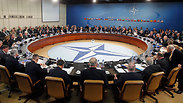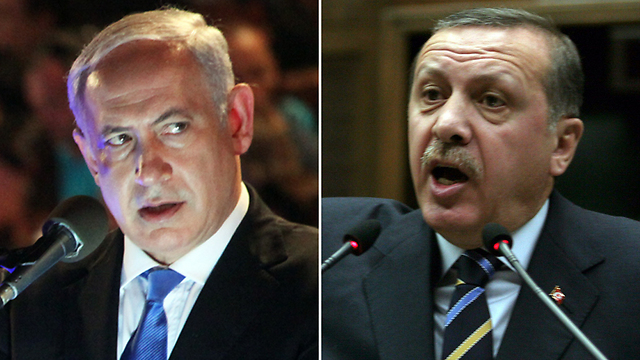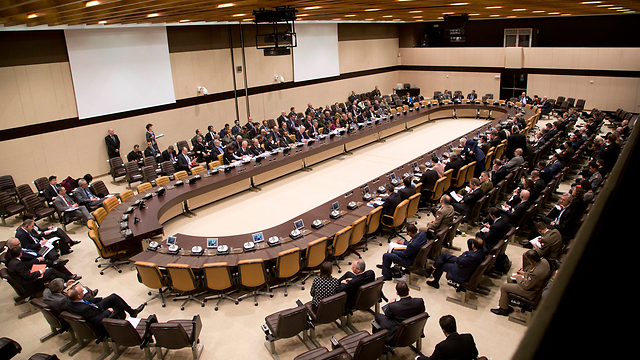
Israel’s status at NATO headquarters gets an upgrade
Jerusalem to open offices at North Atlantic Treaty Organization's Brussels headquarters, with its ambassador to the EU, David Walzer, doing double duty as representative to the organization.
NATO, the North Atlantic Treaty Organization, has upgraded its ties with Israel, bringing Jerusalem even closer into its circle at a time of mounting instability throughout the Middle East.
Israel will open offices at NATO’s Brussels headquarters and will credential its representative, Israeli Ambassador to the European Union David Walzer.
Prime Minister Binyamin Netanyahu welcomed NATO’s “inviting the State of Israel to open office at the organization's headquarters,” adding that he saw the move “as an important expression of Israel's standing in the world.”
“The countries of the world are looking to cooperate with us due to – inter alia – our determined fight against terrorism, our technological know-how and our intelligence services,” he said.
In a statement posted on its website, NATO announced that it had “agreed to accept the request that an official Israeli Mission be established at NATO headquarters.”
In what some interpreted to be a tampering down of Israel bravado, the statement added that "NATO has invited all partners to open diplomatic missions to the Headquarters of the Atlantic Alliance in Brussels.”
Israel has been a member of NATO's Mediterranean Dialogue since December 1994.
But the real news behind the upgrade was that that Turkey, which has used its membership in NATO to block Israel’s request for years, had lifted its veto and may, despite the lack of a formal agreement for normalization of ties, be ready to patch up a six-year rift with Israel.
Gen (res.) Yaakov Amidror, Israel’s former National Security Adviser, said that “as a small country all contacts with international organizations are important to us, both so as to bring our voice to the table and, no less, as a way of learning from one another.”
Speaking with The Media Line from Europe, he said “a small country such as ours, with real problems and needs and also the need to present its case in public forums, should actively promote all contacts with multinational groups, most definitely with a large and important organization like NATO.”
Not all Israeli experts were quite as convinced, though in Jerusalem the upgrade is viewed positively across the board.
Ephraim Inbar, the director of the Begin-Sadat center for Strategic Studies at Bar-Ilan University and an expert on Israel-Turkey relations, said Turkey’s acceptance of an Israeli office at NATO headquarters “is apparently a gesture within the framework of negotiations to end the crisis between the two nations.”
“It’s not nothing,” he told The Media Line, “but it is a symbolic move. We have representative offices in all too many unimportant countries, too. It’s not that big a deal.”

Asked about the now abandoned veto at a press conference in the Turkish capital of Ankara, Foreign Minister Mevlut Cavusoglu supported the Israeli upgrade and said Jordan, Qatar and Bahrain should get similar treatment. “This isn’t just Israel, the same right needs to be given to all the southern partners,” he said.
There are any number of reasons Turkish president and strongman Recep Tayyip Erdoğan may have decided this is the week to play nice with Israel, but simple exhaustion may be one of them.
Turkey, in crisis with the Jewish state for the past six years, since Israel staged a raid on the Mavi Marmara, a boat attempting to break the Gaza blockade, in which ten Turkish citizens died, finds itself at odds with almost every regional neighbor.
Supporting the rebels, Turkey is in an undeclared war against Syrian president Bashar Assad. Diplomatic ties to Egypt, a regional colossus, were ruptured over Turkey’s support for the Muslim Brotherhood, which was unseated by current President Abdel Fatah Al-Sissi. Turkey is embroiled in an ongoing civil war with nationalist Kurds. It is at an impasse with Russia, with whom it has skirmished in the Syrian theater.
For Gallia Lindenstrauss, a researcher at Tel Aviv’s Institute for National Security Studies who specializes in Turkish foreign policy, loosening the anti-Israeli veto at NATO “is one of the more tangible forms any normalization agreement will take, and Israel has waited for it for a long time.”
Speaking with The Media Line, she said it indicated that “the deal is very close.”
In 2009, in a pre- Arab Spring, pre-Mavi Marmara world in which Turkey found itself resurgent, foreign minister Ahmet Davutoglu designed a foreign policy based on a principle he called “zero problems with neighbors.”
The congenial-sounding policy was formulated only a few months after a heated exchange about the loss of civilian life in Gaza between a fervid Erdoğan and Israel’s then-president, Shimon Peres. Erdoğan stormed off stage after protesting that Israeli air strikes were "very wrong" and saying "many people have been killed."
But by the summer of 2013, only four years after Davotoglu’s reboot, the journal Foreign Policy published an article entitled How Turkey Went from Zero Problems to Zero Friends.
This week, he seems to have lost definitively. Now prime minister, Davotoglu resigned on Thursday after losing yet another political battle with Erdoğan, whom the British newspaper The Spectator has dubbed “the most powerful man in Europe.”
Less sympathetically, the headline is followed by “Turkey’s thuggish president has European leaders exactly where he wants them.”
Lindenstrauss points out that lifting the veto on Israel also resolved long-standing tensions between NATO and its Muslim member states. “Turkey had the role of limiting the constructive cooperation between NATO and Israel, and this has been a big problem.”
The next round of Israeli-Turkish talks, which are expected to be critical, is scheduled for later this month. Most of the points of contention have been resolved, including the issue of Israel scaling back its blockade of Gaza—Israel has purportedly agreed to enable Turkey to carry out a number of infrastructure projects there, such as building a new power plant (in a collaboration with Germany) and building a long-awaited desalination plant. The principal open question regards the activities of Hamas in Turkey, where Israel claims the planning and financing of West Bank terrorism is conducted sotto voce.
Article written by Noga Tarnopolsky
Reprinted with permission from The Media Line











